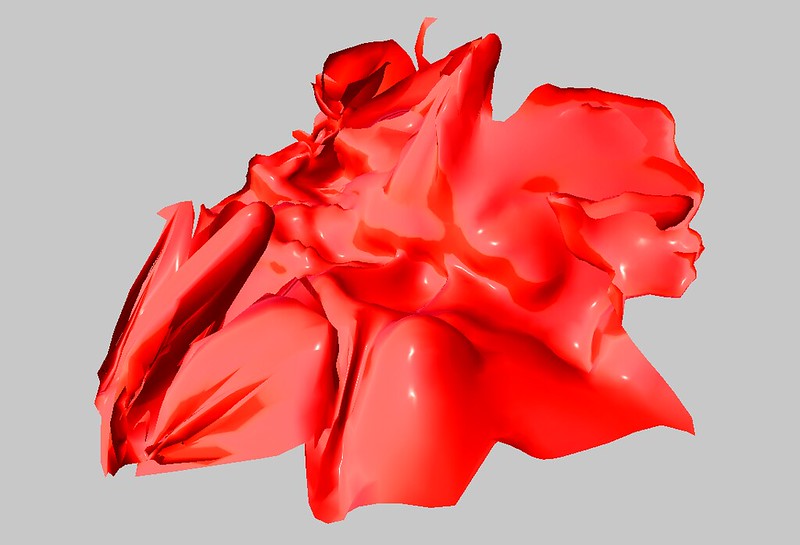
Meshmixer Experiment (Hollow Pink Scooped Out Shell)
Georges Bataille in The Object of Desire is the Universe, or the Totality of Being (The Accursed Share II) writes:
“The intellect fails, in fact, in that with its first impulse it abstracts, separating the objects of reflection from the concrete totality of the real. It constructs, under the name of science, a world of abstract science, copied from the things of the profane world, a partial world dominated by utility. Nothing is stranger, once we have surpassed it, than this world of the intellect where each thing must answer the question "what is the use of that?" We then realise that the mental process of abstraction never gets out of a cycle in which one thing is related to another, for which the first is useful; the other thing in turn must be useful...for something else. The scythe is there for the harvest, the harvest for food, the food for labour, the labour for the factory where scythes are made. If, beyond the labour necessary for the manufacture of as many new scythes as are needed to replace the old ones, there is a surplus, its utility is defined in advance: it will serve to improve the standard of living. Nowhere do we find a totality that is an end in itself, that is meaningful as such, that doesn't need to justify itself by pleading its usefulness for some other thing. We escape this empty and sterile movement, this sum of objects and abstract functions that is the world of the intellect, only by entering a very different world where objects are on the same plane as the subject, where they form, together with the subject, a sovereign totality which is not divided by any abstraction and is commensurate with the entire universe.”Recently, someone asked me why I make “work” and the phrase that instantly sprung to mind was “totality of being”. Like Bataille writes, the object of my desire is the totality of being. What I understand is that the utility or use-value of an object or an action is often taken to provide meaning or its raison d’etre, but this exists in an absurdly endless deferral of utility; of an action or object deriving its meaning from being useful to someone or something else. As Bataille points out in many of his writings, this could end in two ways: one could be that there could be an infinite cycle of deferral to the point where every single thing (which relies on something else for meaning) actually has no meaning at the end; or that the point is that there must be a “true end” – something with no use-value in itself. Therefore the only way to escape this cycle of abstraction is to look to a state of totality with the entire universe. A totality of knowledge of the universe.
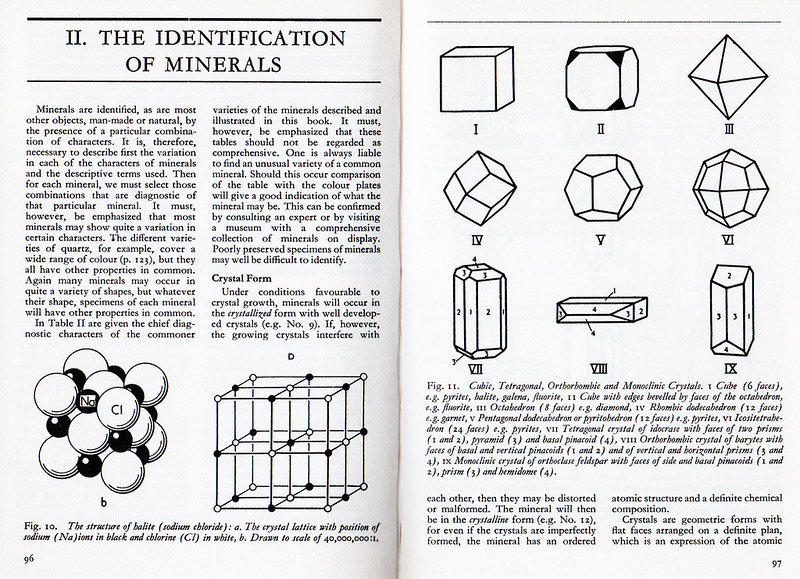
From a book I picked up at the Sussex Mineral Show. This year I wanted to restart the Royal Amateur Expedition Society for the benefit of all the amateur geologists, amateur archaeologists, amateur rock collectors - anythings. Collecting Rocks and Minerals are a good example. What use is it to start a rock collection, or to be able to identify and organise a vast collection of minerals?
Is "endless" autodidactism or the acquisition of knowledge something with no use-value in itself? I think the purest reason for learning is for learning's sake; for sheer curiosity; to remain in a state of mystery - to not find a use for the knowledge one is about to gain (at least not yet); therefore to me the more obscure, technical, or specialist "anorak" fields are of most interest - even or especially if at present I don't have any reason for making use of the knowledge I have or will acquire. In an urban life (and I know no other way of life), there is no need to learn or understand "everything" as many systems and workings of things are rendered opaque or intentionally occluded from the end-user. We do not need to understand power/electrical systems, lighting systems, HVAC systems (heating, ventilation, and air conditioning), fire alarms, plumbing systems, lifts, elevators, security systems - in order to work or live in a place with all of the following. Specialisation apparently frees us up to focus on other things, but at the expense of a rich, full understanding of how the world works. But how much of this is abstraction - or perhaps even a misreading...?
I have always thought of autodidactism as something that exists between production and consumption; I have to be a voracious consumer of information, data, or technology before I have the sufficient fundamentals to launch off and produce new observations, connections and predictions. I often wonder if the data collection and information gathering can be considered of no use-value in itself and the process of producing something useful out of the data is infact the ability to discard or 'sacrifice' data. Meaning and value then is gained from being able to throw away most of the data collected, insofar as a poem is a text with most of the words removed/sacrificed. The sign (data) is fixed in its function in having to transmit to us practical information that is turned to knowledge; but I think of the sign itself like a ridiculous, weird plastic scooped out shell to be discarded once its function is fulfilled. Why does the wrapper or the shell even remain behind? It is such a terrible distraction!
In speculation, reverse engineering or creating an artificial universe, its the other way around. You start with the knowledge that the sign ought to have transmitted. And that is where I find that the forms I have found for expressing the story is thus far inadequate. And ridiculously, I seem to instinctively turn to writing to find a clue for the visual form. At its most fundamental level, to me, the act of writing is similar to arranging a collection of items on a shelf and imbuing them with systems of enumeration - systems by which knowledge can be organised. Names and description - like ridiculous plastic vac-forms sucked over objects.
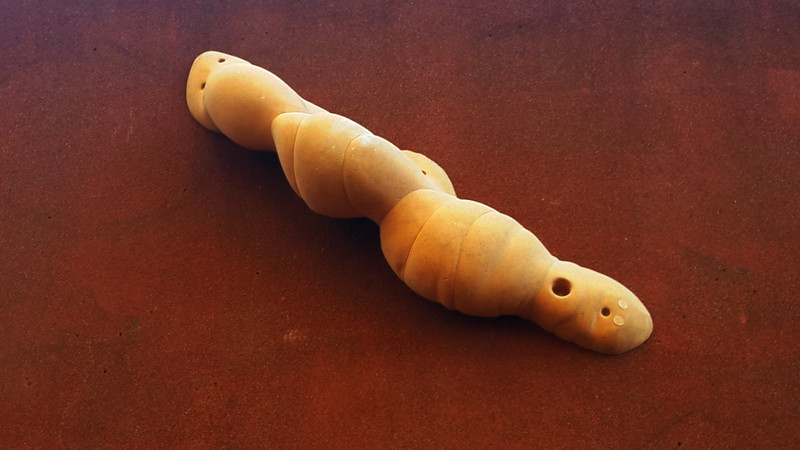
Climbing rocks. What a ridiculous sport. Look at this ridiculous rock climbing grip, presumably cast in something like resin. A plastic form cast over a rock-shaped object, or sculpted to look a bit like one, or at very least a cartoon-shaped rock I suppose. The other day we accidentally went to the climbing centre to have breakfast. Accidentally! I have never been to a climbing centre but I will go anywhere and do anything at least once. I bumped into my friend James there, and he asked me if I was climbing that day. "NO! I HATE CLIMBING!" I instinctively said, a little too forcefully. Poor James was confused. "What are you doing at the climbing centre then?" At that moment I realised that I did hate climbing. (It was a meeting that should never have happened)

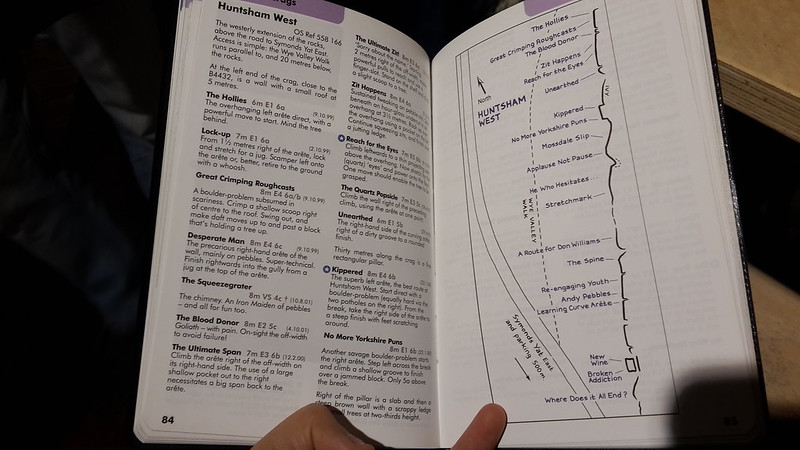
At The Castle I discovered that everything from rock climbing routes - to even the ropes are given elaborate, seemingly euphemistic names by unknown climbers that have come before you. I don't know, I guess climbers have a long time to think about it as they meditatively ascend to the artificially constructed indoor climbing peaks. I was simultaneously attracted and repulsed by the notion of allowing the person (who thinks they had first ascent) the right to give a rock climbing route a name of their choosing that may or may not have any direct relation to the route or location. There was such opportunity to choose a great name, but there was also the possibility of granting it a name that sounded more like a nasty piece of schoolboy doggerel gone way past its season.
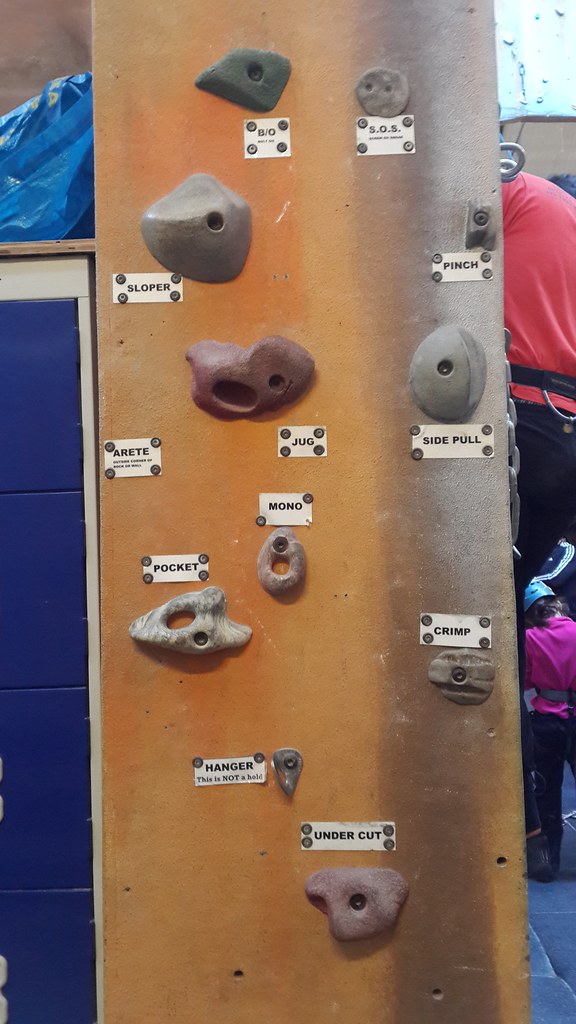
Assuming one derives joy from climbing, if we were climbing for the joy of climbing up a vertical surface; if it were like being in a playground, then I too could understand it. But I was finding the ridiculous (and sometimes distractingly bright) rock climbing grips with their names, the panoply of complicated and expensive climbing gear with fancy aspiration names, and reams of books of techniques for conquering them all too heavy-handed and artificial. Who invented this whole industry of climbing? Who invented the shapes that are used on today's rock climbing grips? If we want to climb rocks, then let's go climb some real rocks! Let's stop messing about with these plastic shapes.
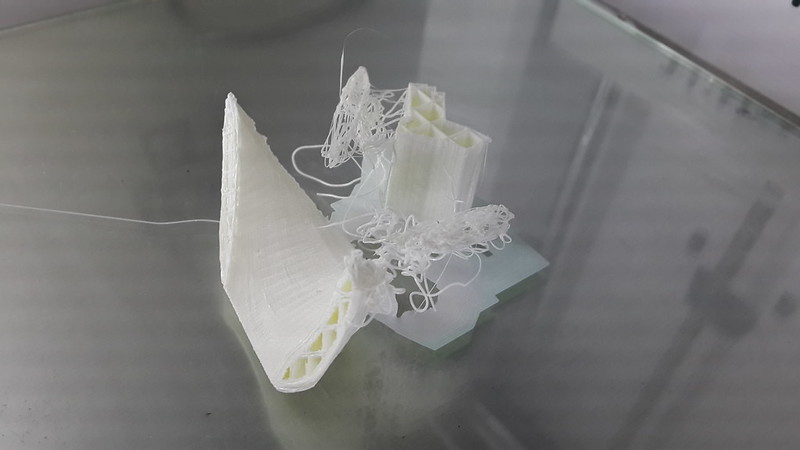
Failed Mobius Strip. 3d printed with Ultimaker 2. Used a brim and supports but the awkward angling meant it was still not enough support, patently.
Unfortunately, ironically, at the moment I seem to be buried under an unruly pile of hollow plastic shells of my own making. But slowly I am digging myself out of this pile of inconsequential prims, shapes and rubble...
I almost separated this post into a new blog but I've finally decided to compile everything into this page.
No comments:
Post a Comment